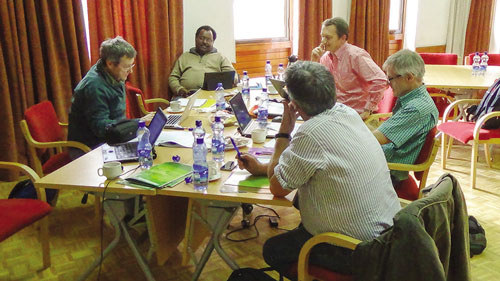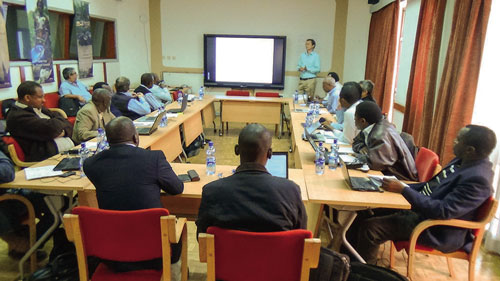By Gift Mashango and Mekuria Mulugetta

Phase II of the Sustainable Intensification of Maize-Legume Systems for Food Security in Eastern and Southern Africa project (SIMLESA) began 1-4 July with a series of planning meetings in Addis Ababa, Ethiopia. SIMLESA-II is a five-year project funded by the Australian Centre for International Agricultural Research (ACIAR).
Members of the project management committee (PMC) met on 1 July to ensure that management and implementing partners have a common understanding of project objectives, targets, milestones, indicators and the assignment of coordination responsibilities. The PMC includes Olaf Erenstein, director of the Socio-economics Program; Bruno Gérard, director of the Conservation Agriculture Program; Mekuria Mulugetta, SIMLESA project coordinator; Daniel Rodriguez of the Queensland Alliance for Agricultural and Food Innovation; and Peter Craufurd, SIMLESA strategy leader.
Based on lessons learned from SIMLESA’s first phase, the PMC adjusted the design of activities, timelines and strategies for scaling out SIMLESA practices to farmers. One recommendation was to assign a coordinator to each of SIMLESA’s four objectives: Paswel Marenya for objective one, Isaiah Nyagumbo for objective two, Peter Setimela for objective three and Michael Misiko for objective four. The PMC noted that during the first phase, research scientists were operating in silos, and they urged the scientists to work as a team since the project objectives and activities are more closely linked in the second phase.

The PMC also appointed a committee to spearhead the selection of partners for competitive grants in each country. The committee will consist of the national coordinator for each of the five target countries, an ACIAR representative, a project steering committee member, the objective four leaders and a PMC member. The two new partners, the International Livestock Research Institute and the International Center for Tropical Agriculture, are responsible for forage- and soil science-related activities, respectively.
A joint meeting with SIMLESA country coordinators was held on 3-4 July. The coordinators gave presentations on achievements of the first phase and lessons learned, plus the challenges and strategic plan for the second phase. Planned project activities for the second phase are not homogeneous across the SIMLESA countries; they are guided by the country’s priorities, the amount of support that will be required and the opportunities for scaling out. Discussion centered on strategies to scale out new technologies to more than 650,000 small-scale farmers by 2023.
At the end of the meeting, all participants agreed on an implantation plan that will be further refined at the national level during country-specific planning and review meetings.
 Innovations
Innovations